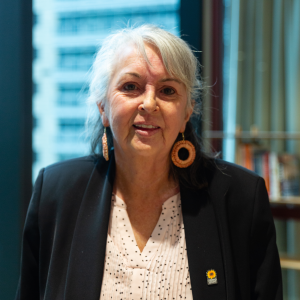INDIGENOUS BUSINESS AUSTRALIA





As IBA proudly recognises its 50th anniversary this year, another significant milestone stands alongside it, the 25th anniversary of Bawrunga Aboriginal Medical Service (BAMS). These shared anniversaries are more than numbers; they are a reflection of generations of resilience, partnership, and unwavering dedication to uplifting First Nations communities.
As one of the original founders, Weilwan woman Leavina Reid helped establish BAMS in 1999 to reduce the barriers Indigenous communities faced in accessing culturally appropriate GP clinic services. Leavina herself experienced firsthand the difficulty of accessing healthcare for her and her then 3-year-old daughter when they needed medical treatment.
At the local practice in the Nambucca Valley, the doctor asked Leavina, “Who do you want to be bulk billed, yourself or your daughter? I can only bulk bill one.” Without hesitation, she chose her child. She went without care that day, but the experience left her feeling humiliated and deeply hurt.
Mother’s love sparked a movement
That moment became a turning point. It pushed her to ensure no other Aboriginal person would be made to feel that way again and shamed in the same way. It was a mother’s love that sparked a movement, one that would grow into a legacy of care, dignity, and empowerment for generations to come.
Fast forward 25 years, and BAMS has transformed into one of the largest Aboriginal community-controlled social enterprises in NSW, operating multiple GP primary health clinics. Its journey is marked by groundbreaking achievements, including securing the Commonwealth Government tender in 2011 to build and operate the Coffs Harbour GP Super Clinic which has now been sold to a group of doctors, including a long-serving GP with deep ties to the clinic. This thoughtful transition ensures the clinic’s continued success and sustainability, while honouring the legacy of care established over the past decade.
Reflecting on this milestone, Leavina shares, “Our work is about more than just healthcare; it’s about making a difference in the lives of our people, ensuring they feel seen, heard, and cared for... Our journey is a powerful testament to what can be achieved when we work and move as one.”
Strategic expansion as 2nd chapter
This strategic move allows BAMS to focus on the 2nd chapter of its mission, BAMS Impact. This initiative expands beyond clinical care to address broader social determinants of health, including education, housing, and employment. With a foundation built on 25 years of expertise and deep community engagement, BAMS Impact is set to collaborate with key stakeholders with the aim of solving the various social issues faced by Indigenous communities, improving both clinical and social wellbeing thereby closing the gap in Indigenous health and wellbeing.
One of its first projects involves a partnership with a prominent Sydney law firm to provide pro bono culturally appropriate legal services at BAMS medical centres. Other initiatives in progress include establishing scholarship funds with the Australian Community Foundation and launching Indigenous Community Green Energy Projects to create sustainable job opportunities and strengthen rural infrastructure.
Supporters in progress
From humble beginnings to a thriving network of clinics, BAMS has become a beacon of Indigenous led healthcare innovation. Throughout this journey, IBA has supported them with business support and finance lending.
Deputy CEO, Sean Armistead, says: “Being part of BAMS’ journey has been a privilege. Their incredible growth and unwavering commitment to the health and wellbeing of First Nations communities are a testament to the strength of grassroots initiatives. We are proud to have walked alongside them.”
Throughout BAMS’ journey, many have played instrumental roles in its success. Leavina highlighted Dr. Larry Yee, whose support has been invaluable from the early days of the first Bowraville clinic in 1999 to the successful tender for the Coffs Harbour GP Super Clinic in 2011. His belief in BAMS’ mission and his contributions to its growth have helped shape its evolution.
As BAMS Impact prepares for its new journey, Dr. Yee shares his excitement “The timing is perfect, it’s as if the universe has aligned in our favour. BAMS Impact is poised to lead a transformative revolution in Indigenous healthcare, setting new standards for impact, success, and future potential.”
As IBA celebrates 5 decades of supporting First Nations businesses and communities, BAMS stands as a testament to the extraordinary achievements made possible by grassroots initiatives and strategic partnerships. Its journey from a single clinic to a network of thriving healthcare facilities embodies the power of determination and collaboration in turning aspirations into lasting legacies.
Leavina captures the essence of BAMS' story: “We’ve come so far because we believed in a vision larger than ourselves. And now, with BAMS Impact, we’re taking that vision to a whole new level.”
Rooted in the strength of the past and driven by the purpose of today, together IBA and BAMS are creating a future where every generation is empowered to live well, lead with confidence, and shape their own story.
2025 is a big year for IBA as we continue to celebrate impact, resilience, and community over 50 years. In the latest edition of our e-newsletter, we're excited to launch our latest Impact Report, introduce you to Tim from the IBA team, and share inspiring customer stories:
We also share quick links to our upcoming home and business workshops.
Check out our e-newsletter available online: Recognising Indigenous success through the generations
And don’t forget, you can subscribe via our website and receive it direct to your inbox.

Welcome to “The New Dreaming Podcast”, a powerful platform created to celebrate strength, success, and storytelling among Aboriginal and Torres Strait Islander men.
Born from a partnership between IBA and New Dream Productions, this special series holds space for truth-telling and real conversations that inspire, challenge, and empower. Each episode features First Nations men who are reshaping their futures, sharing journeys of resilience, leadership, and cultural pride in a space that honours their voices.
From stories of overcoming adversity to reflections on identity and purpose, the series invites listeners into conversations that are honest, uplifting, and deeply grounded in lived experience.
It’s a space where voices are heard, stories are honoured, and futures are imagined—together.
From his early days in Bowen dreaming by the shoreline to launching a coffee window beside his sister’s clinic, Josh’s journey is one of creativity, resilience, and purpose. Drawing on his background in Indigenous health and HR, he’s built a business that prioritises staff wellbeing and customer connection, challenging industry norms with professional practices and a family-first culture.
With plans to expand into deli-style offerings and a wine bar, Josh continues to grow his impact while staying true to his artistic roots in music. His story is a testament to trusting your instincts, building with intention, and creating spaces where people feel truly seen.
With no formal business training or entrepreneurial background, Jordan followed his instincts, diving into podcasts, audiobooks, and industry research to carve his own path. Support from IBA played a pivotal role, helping him turn ambition into action with practical guidance and funding.
Jordan speaks candidly about the realities of burnout and the importance of balance, offering hard-earned wisdom for anyone considering a leap into business. His story is a powerful reminder that trusting your gut and taking the first step can lead to a life of purpose and growth.
Raised in Logan as one of nine siblings, James draws strength from his Gunditjmara and Wiradjuri roots, which now shape the heart of his digital marketing business. After years of watching his cultural knowledge benefit others, he launched Barragi Mawang to empower Indigenous businesses with digital tools while staying true to community values.
With support from IBA, James has built a platform that blends business with storytelling—producing documentaries like Yurlu Country and writing about his great-uncle, the first Indigenous person commissioned in the Australian Army. His journey is a reminder that success doesn’t have to mean speeding up—it can mean slowing down to honour culture, connection, and authenticity.
In this candid episode, Adam explains how starting with social media before moving into e-commerce has helped First Nations businesses grow at the right pace. His story highlights the importance of relationships, especially with support organisations like IBA, and shows how real-world connections are just as vital as digital tools.
With new initiatives like the POS Cafe Shopify app and tailored programs for service-based businesses, Adam and his partner Carmel are creating meaningful change while staying grounded in culture and community.
Indigenous Business Australia (IBA) is proud to announce its partnership with New Dream Productions, founded by proud Badtjala man David Cook, to launch a special IBA series of “The New Dreaming Podcast”.
As one of the first initiatives under IBA's new support network for Aboriginal and Torres Strait Islander men, this partnership aims to empower economic independence among First Nations men by creating a powerful platform for truth-telling.
The New Dreaming podcast provides a space for real, meaningful conversations that empower, challenge, and inspire. Through the voices of those who have broken barriers, found their purpose, and reclaimed their stories, the podcast uncovers the truths that shape Aboriginal and Torres Strait Islander people.
IBA Deputy CEO Sean Armistead said, “This initiative grew from meaningful conversations within Galambany, our Indigenous staff network, where the need for more support for First Nations men in business came through strongly. This work is a direct response to those voices. It supports Aboriginal and Torres Strait Islander men as they navigate their own paths to economic independence.
“Partnering with New Dream Productions was a powerful way to begin this journey through a podcast that holds space for First Nations men. It brings awareness to the silent struggles some of our men are facing and creates a safe space for them to share and be heard.”
Managing Director David Cook said, “New Dream Productions is proud to partner with IBA on an important project that spotlights the voices of mob who are reshaping the future, story by story.”
“This podcast is about truth-telling, inspiration and the power of First Nations leadership. Backed by IBA’s belief in our vision, we’re creating a space for those voices to lead the conversation.”
Be part of the movement. Subscribe to The New Dreaming Podcast on YouTube and join the conversation that’s shaping the future of First Nations men in business.
Media contact: Tara Toohill 02 9207 6362 or tara.toohill@iba.gov.au
IBA will be around the country for NAIDOC – we love this time of year! It’s all about honouring Aboriginal and Torres Strait Islander voices, culture, and resilience – which happens not just this week but every week.
 The 2025 NAIDOC theme is The Next Generation: Strength, Vision & Legacy. And IBA is not the only one recognising 50 years in 2025 – NAIDOC Week marks a 50th powerful milestone as well.
The 2025 NAIDOC theme is The Next Generation: Strength, Vision & Legacy. And IBA is not the only one recognising 50 years in 2025 – NAIDOC Week marks a 50th powerful milestone as well.
Come see us or find other events on the NAIDOC website!
Brisbane / Turrbal & Yuggera Country
Cairns / Gimuy Walubara Yidinji Country
Melbourne / Wurundjeri Country
Sydney / Gadigal Country
Wagga Wagga / Wiradyuri Country
Townsville / Bindal & Wulgurukaba Country
Perth / Whadjuk Noongar Country
And more locations to be confirmed!
Taunurung woman, Nicole, is a successful business and homeowner, with a lot to be proud of. But she takes the greatest pride in the values and financial independence that she inspires through generations of her family. 
Nicole was determined from a young age to get on the property ladder early, to build her financial future. She achieved this at just 19 years old, through a loan with ATSIC (which later became IBA) and bought the ex-housing commission home that she’d grown up in.
“It was small, but over the years I made improvements to it,” Nicole said. “Funny thing is – I always understood the value of owning a home. I didn’t want to pay rent and waste money that could go into my own home.”
In time, Nicole transitioned to a mainstream lender and moved to another home. Fast-forward almost 40 years and one of Nicole’s three daughters, Georgia, has recently been approved for her first IBA home loan.
“I told Georgia about IBA and the value in saving to get her own place,” Nicole said. “I wanted her to have her own place too, not to waste money on rent.”
“It’s hard work and a lot of paperwork, but worth it. She’ll have her own home.”
“If Georgia had to go down a regular path, it’d be years before she had enough saved for a 20% deposit on a house. So, I kept saying to her, ‘make the enquiry at IBA’.”
Georgia and her partner, Mackenzie, have just found a home of their own with a backyard to share with their adored animals – she is the owner of three cats and wants to add to the brood with chickens and a dog.
“Sticking our sold sign onto the sale board was an amazing feeling!” Georgia said. 
“I grew up with mum always having a home, and she inspired me to want the same.”
“I did rent for a while and it’s hard to save and have security when renting. I could see that the money I was paying in rent could be going into a place of my own.”
“So, I moved back to Mum’s for twelve months to squirrel my money into savings.”
While Georgia was looking for her home, Nicole was with her every step of the way and helping her go through building reports, paperwork and giving her advice on her home purchase.
“Mum has made me very aware of what I’m getting into!” Georgia laughed.
Nicole also owns and runs a successful business, Gerrbik Laundry Services. She bought it from her dad (then known as Complete Workwear Laundry Services) with an IBA business loan in 2015. We met her back then to yarn about her business journey: Poised for success - Indigenous Business Australia.
While Nicole’s business is flying now, she has faced huge challenges. Her core business is servicing the airline industry, and she says COVID-19 restrictions wiped out 95% of her business overnight. Nicole says that at times she thought she might lose her business, and her house (which had been used as collateral for the business). But managed to keep going and weather the storm.
"My connection with IBA has been a lifeline to me!" said Nicole. "They believed in me which has given me a lot more belief in myself."
Her hard work and tenacity paid off and the business revenue has since tripled from pre-Covid including a 7-year contract with an airline for their laundry service. Nicole credits the business success to her amazing team which includes three generations of family working with her, something that she is very proud of.
Georgia has also inherited her mum’s strong work ethic. She is a professional baker and part of a boutique artisan bakery, working early hours and long days. She’s not afraid of hard work.
Nicole’s impact through the generations doesn’t stop there. She’s also encouraging one of her other daughters to start preparing to apply for an IBA loan and saving for a deposit.
“It’s about sustaining yourselves through life.” Nicole said. “We need to be self-sustainable. I want to pass that on to my kids and grandkids.”
“My nine-year-old grandson already wants a house too,” she continued. “He even saved his birthday money. That’s exciting - knowing it’s passed down. That will be a legacy for our family.”
~~~~~~~~~~~~~~~~~~
Nicole spoke at IBA’s release of our latest impact report on 29 May on Gadigal Country. She discussed the generational impact of financial wellness. Check out IBA’s impact reports here: IBA Impact Report 2024 - Indigenous Business Australia
Desiree and her two younger sisters enjoyed sitting down for a yarn about life and what ‘financial wellbeing’ means to them. IBA recently hosted a workshop at Kurbingui Youth & Family Development to support the community on their financial goals.

Kurbingui is an Aboriginal community-based and driven not-for-profit organisation that offers services to Aboriginal and Torres Strait Islander community members, families, children, and young people living within the Greater Brisbane, Moreton Bay, and Southeast Regions.
IBA’s home ownership guru, and Senior Business Development Manager, Jenny Pepper hosted the workshop and was touched by the group’s interest in the content discussed.
"This is the second session I've facilitated with new trainees at Kurbingui. Dani and the team recognise the importance of setting these young people up for success as they start in the workforce. One young man told me, 'Thanks for coming today. I might not have looked like I was listening, but I was. The things you talked about really opened my mind up.' Hearing this was music to my ears and absolutely filled my cup," said Jenny.
The financial decisions you make today can have a lasting impact, so getting the tools and information early helps to make informed decisions for the future. It’s all about implementing good habits now – and that’s what IBA shares through our ‘Financial Wellbeing’ workshops.
Desiree came to the workshops along with her two younger sisters to see what it was all about. She said, "The workshop was incredibly eye-opening. It made us really think about our spending habits and how we can manage our money better.”
“One thing I learned is that if you're constantly dipping into your savings, you're not really saving. So, I've decided to create separate bank accounts to avoid that temptation," said Desiree - one of her key take aways from the workshop.
Desiree also talked about how the workshop is helping her on her journey to home ownership.
"It's already made a big difference. I'm trying to teach these principles to my younger sisters. It's all about making sacrifices now for a better future" she said.
Being at the workshop with her sisters was a special experience for Desiree.
"It felt really good to be there as a family. We can now support and encourage each other to make better financial decisions. It's opened our eyes to how much we actually spend and how we can save more effectively."
Desiree's motivation to pursue home ownership reflects the positive trends highlighted in our Pathways through Housing report. The report shows that the number of First Nations households owning homes has more than tripled from 46,150 in 2001 to 145,100 in 2021.
This growth reflects a strong desire for self-determination and the benefits of home ownership, such as security, wealth building, and freedom of choice. Desiree's journey is a testament to these positive trends, showing how financial education and support can pave the way for successful home ownership.
As we look to the future, Desiree's words resonate with IBA’s mission, "it's about making sacrifices now for a better future" she said. This sentiment perfectly aligns with the 50th anniversay of IBA's Indigenous Home Ownership Program.
Our theme, "50 Years: Through the Generations," embodies the resilience, wisdom, and courage of past generations while celebrating the innova tion and passion of the present.
IBA’s 50th anniversary emblem embodies connection, progress, and community. The 5 and 0 are formed from the elements of the IBA brand and feature the shapes within the IBA logo. These lines and circles signify the pathways, and the milestones accomplished alongside our customers. The design honours our shared journey and achievements through the generations.
Desiree's journey and the experiences shared in our workshops are a testament to the power of community and the importance of financial education. Together, we are building a brighter future for all generations.
Join us as we continue to empower our community with the knowledge and tools to achieve financial wellbeing and home ownership.
Find out more about IBA’s free home ownership info sessions and financial wellbeing workshops.
Did you know that we also have Business Skills workshops? Find out more here.
Has your home or business been impacted by the recent severe weather events in New South Wales?
If you have an IBA home loan or business finance product and have been impacted by this weather event, we want to reassure you and your family that IBA is here in times of need.
Customers impacted by the recent natural disaster can apply for an emergency natural disaster relief grant – $5,000 for IBA business finance customers and/or $2,000 for IBA home loan customers who reside in the following Local Government Areas:
Impacted customers will receive a direct link to apply. Applications accepted until midnight 14 July 2025, or until funds are exhausted (whichever comes first).
Additional information and resource links are below:
Indigenous Business Australia (IBA) launched its fourth impact report at an event on Gadigal Country (Sydney NSW) on Thursday 29 May 2025.
Joined by IBA’s Board Director Josh Gilbert and a panel of customers and research partners, IBA celebrated the compelling findings.
The research was completed in collaboration with Yindyamarra Consultancy, Lonergan Research, and Kowa Collaboration. It included an online survey for an extended reach across metropolitan, regional, and remote areas as well as community consultation across five case study locations.
The specific case study locations include Dharug (Western Sydney, NSW), Ngurraiillam (Shepparton/Goulburn Valley, VIC), Kaiwalagal and Badu (Torres Strait Islands, QLD), Ngarluma (Karratha & Ieramugadu, Pilbara, WA), and Mparntwe (Alice Springs, NT).
The new report is the latest in a series of groundbreaking studies into the impact of IBA’s activities.
The theme of the latest report is ‘pathways to financial wellbeing’ which explores what wellbeing means for Aboriginal and Torres Strait Islander people and how IBA’s activities support financial wellbeing.
Results note a wide range of positive impacts including a sense of pride, safety, self-confidence, security, community wellbeing, cultural practice, and inspiration to have dreams for the future.
Stories shared at the launch event by the inspiring panel of speakers highlighted the impacts they experienced to their own financial wellbeing journey. And the report includes quotes from a variety of others positively impacted.
Worimi man and IBA Board Director Josh Gilbert notes the impacts to First Nations community.
“The report confirms that Country, culture, and community are important determinants of Aboriginal and Torres Strait Islander people’s wellbeing.
“Home and business ownership contribute to wealth-building and stability, fostering stronger community ties and the freedom to practice and promote culture. It helps people to become financially stable, safe and secure, build a future for their family and children, be independent, and have more control over their life.
“By fostering financial wellbeing, we provide meaningful support that empowers individuals and strengthens communities.”
IBA Acting CEO Shanti Rama adds, “We measure the impact of our programs and services by asking our customers how they define success from their own perspective.
“The report shows that our customers experience markedly higher financial wellbeing compared to the broader Aboriginal and Torres Strait Islander population.
“Importantly, these positive wellbeing outcomes continue even after customers leave IBA's programs.
“IBA’s impact reports show that when capital is distributed in a targeted way, it has a significant positive impact on the lives of Aboriginal and Torres Strait Islander people.”
The new report comes on the back of recent changes to IBA’s enabling legislation, the Aboriginal and Torres Strait Islander Act 2005, removing the restriction on IBA borrowing and raising money (note: the Rules governing the scope of IBA’s power to borrow and raise money are still to be determined and need to be agreed by the both the Minister for Indigenous Australians and Finance Minister).
The change will enhance IBA’s ability to leverage its asset base to support more Aboriginal and Torres Strait Islander people in achieving their dreams of home ownership, business enterprise, and community investment. It will provide IBA with the flexibility to explore new opportunities and expand the range of financial products it can offer to meet market needs.
Find the IBA Impact Report 2024 and the ‘Highlights’ version to view and download from the IBA website, as well as the previous impact reports: IBA Impact Report 2024 - Indigenous Business Australia.
Media contact: Tara Toohill 02 9207 6362 or tara.toohill@iba.gov.au
About Tim

I consider myself a self-proclaimed professional fisherman. I have caught everything from tuna, salmon, sharks, and one-time, a 30m humpback whale (yes, I let it go). The most interesting part of fishing is, ‘I don’t eat fish.’
Growing up I lived in places like Camperdown to Newtown to Tathra to Bega (all NSW) to growing up in a quiet country town in ACT. I am both a Yuin and Gadigal man with Fijian and Indian ancestry.
Apart from always finding me at Tathra wharf trying my luck fishing, I love all things rugby (League & Union, GO MANLY), cricket, abseiling, canoeing, kayaking and being a part-time superhero.
What is your role at IBA?
I am a Senior Securities & Settlements Officer in the Business Solutions program. My role includes a number of tasks which is not limited to drafting and issuing loans, security documentation, facilitating release of funds to customers, vendors, settlement agents, and assisting other teams on enquiries regarding securities and settlements matters, processes, and requirements.
Highlight at IBA/career
Through my time at IBA, I never aspired to be a director, CEO or chairman. I always just wanted to do something that I enjoyed. With IBA, I was able to understand and see first-hand the way we directly assist mob, not only individuals but also organisations, in realising their dreams in owning their own home, business, and assisting their own communities.
I have been with IBA now for 20 years since the abolishment of ATSIC in 2005. Overall, I have been attached to the home and business loan programs for nearly 26 years since June 1999 (6 years ATSIC Legal Unit, 6 years with IBA Housing Solutions, then 14 years with IBA Business Solutions since 2011).
Why IBA
Working with and for mob is highly important as only mob can help mob. From my personal experience having lived predominately in an urban area such as the ACT (including foster care for a long period), I had not been exposed a lot to my own culture (both Fijian and Aboriginal), so being with, working with and for, anyone from your own cultural background is very important.
What does 50 years mean to you?
Being able to assist Aboriginal and Torres Strait Islander people in achieving their goals in both home and business ownership for 50 years has been a great achievement for the programs that have continually evolved to meet the needs of our customers. IBA has changed in many ways over the years, but even through the changes and evolving, IBA remains its own unique self.